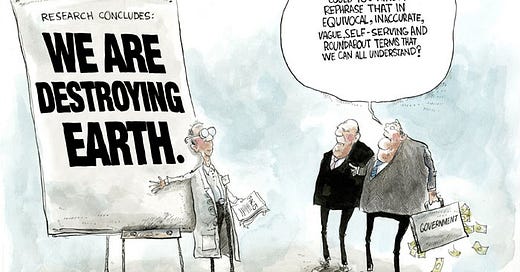
Discover more from Global Climate Compensation
In a remarkable letter from 1615, Galileo Galileo complains to the Grand Duchess Christina of Tuscany about the absurdity of the Church trying to tell him what to think and what to teach:
It is not within the power of practitioners of demonstrative sciences to change opinion at will, choosing now this and now that one; there is a great difference between giving orders to a mathematician or a philosopher and giving them to a merchant or a lawyer; and demonstrated conclusions about natural and celestial phenomena cannot be changed with the same ease as opinions about what is or is not legitimate in a contract, in a rental, or in commerce.1
I started quoting this letter in my climate lectures some time ago and was amazed to realize that many people still have problems with this 400-year-old statement of the obvious. Occasionally, I have even been accused of scientific arrogance: “How dare you suggest that the laws of nature are more important that laws governing politics and the economy?” Of course, this not what I am trying to say. What Galileo pointed out was that the laws of nature cannot be changed, in contrast to the laws governing society. The Laws of Hammurabi (from 1776 BC) constituted a perfectly good legal code, but they would not make much sense today2. We also know that women did not have the right to vote until the 1920s in most countries and that it was legal for parents to beat their children until quite recently. The laws of society change, and it would be possible to introduce new laws abolishing private property and banning carbon emissions tomorrow if deemed necessary. However, we cannot abolish Newton’s Law of Gravity or the First and Second Laws of Thermodynamics. Or as Richard Feynman put it in his Personal Observations on the reliability of the Challenger Space Shuttle:
For a successful technology, reality must take precedence over public relations, for nature cannot be fooled.3
One of my plans for the next six months is to write a book about the sustainability crisis and what to do about it. As I have been lecturing on this topic for more than eight years, I have enough ideas and material. The starting point will be a thermodynamic definition of sustainability, which I believe is necessary for at least three reasons: 1) it shows that climate change is only the symptom of a much deeper problem, 2) it significantly reduces the parameter space of possible solutions, and 3) one cannot argue with physics. It will become obvious that geoengineering is madness and that carbon capture and nuclear power are only moderately useful. The simple truth is that our demand for resources by far exceeds the net primary production of the ecosystem we are part of. This has also been pointed out by Prof. Partha Dasgupta in The Economics of Biodiversity: The Dasgupta Review:
Over the past 70 years, global GDP has increased in real terms by a factor of nearly 15, even while our global demand for the biosphere’s goods and services – our ecological footprint – now far exceeds the biosphere’s ability to supply its goods and services on a sustainable basis.
In other words, our planet is dying! Unfortunately, it is not enough to stop the economy from growing, as it is far too large already.
Since writing a book is a huge undertaking and I want to get it right the first time, I am going to use this substack as a sounding board for testing arguments and ideas. If you follow me here, you might not have to buy the book.
The next post will discuss the Keeling curve, showing the increase in atmospheric concentration of CO2. One can learn a lot from analyzing this curve.
A translation of the letter from Galileo can be found in The Galileo Affair: A Document History by Maurice A. Finocchiaro (Berkley, 1989). The original Italian text is here:
Alla Serenissima Madama, la Gran Duchessa Madre.
….
Io vorrei pregar questi prudentissimi Padri, che volessero con ogni diligenza considerare la differenza che è tra le dottrine opinabili e le dimostrative; acciò, rappresentandosi ben avanti la mente con qual forza stringhino le necessarie illazioni, si accertassero maggiormente come non è in potestà de’professori delle scienze demostrative il mutar l’opinioni a voglia loro, applicandosi ora a questa ed ora a quella, e che gran differenza è tra il comandare a un matematico o a un filosofo e ‘l disporre un mercante o un legista, e che non con l’istessa facilità si possono mutare le conclusioni dimostrate circa le cose della natura e del cielo, che le opinioni circa a quello che sia lecito o no in un contratto, in un censo, o in un cambio.
Galileo Galilei, 1615
Yuval Harari provides a nice analysis of the Laws of Hammurabi in Sapiens: A Brief History of Humankind.
The Personal Observations of Feynman are well wort reading and I will return to them in future posts.
Subscribe to Global Climate Compensation
Cutting the Gordian Knot of International Climate Politics







Can I share on linkedin?